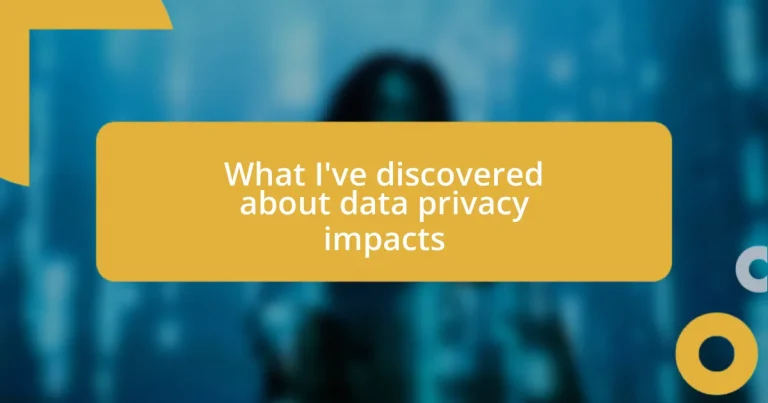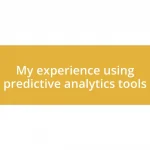Key takeaways:
- Understanding the implications of data privacy involves recognizing how personal information is collected and potentially misused by companies.
- Key principles of data privacy include consent, purpose limitation, data minimization, access and correction, and accountability.
- Current regulations like GDPR and CCPA enhance user rights and transparency, but their impact on smaller businesses raises concerns.
- Future trends in data privacy include increased privacy-focused technologies, the role of AI in safeguarding data, and a potential shift towards user-centric control over personal information.
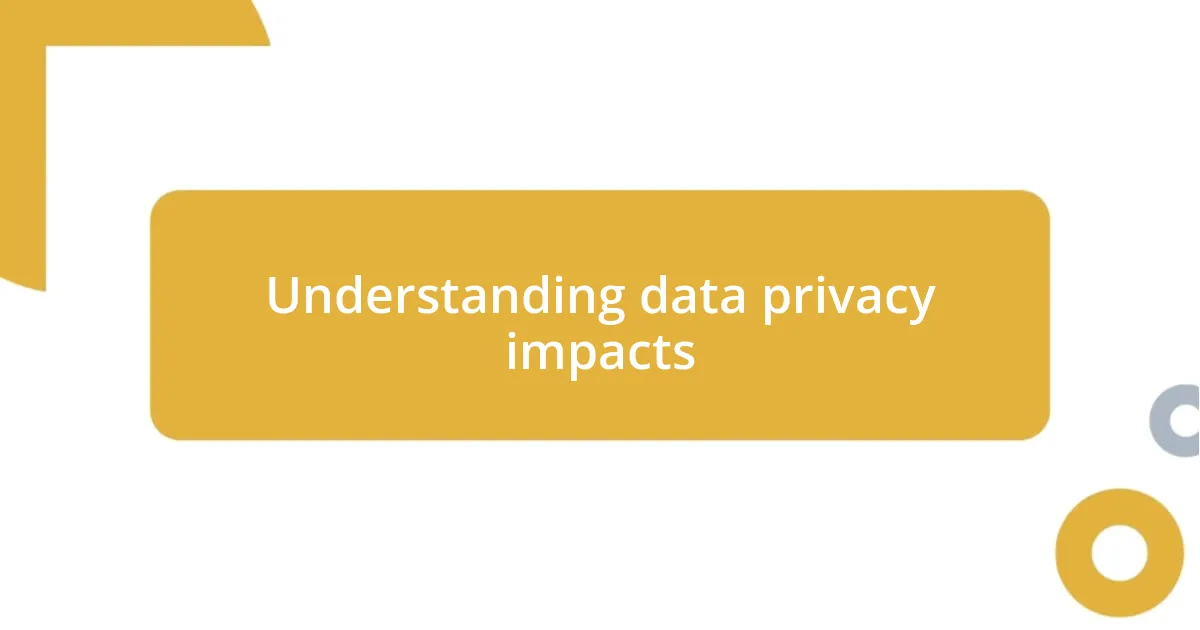
Understanding data privacy impacts
When I first delved into the world of data privacy, I was struck by the sheer volume of personal information that companies collect without us often realizing it. Have you ever thought about what happens to your data after you click “Accept” on those long terms and conditions? It’s a staggering realization; our online actions can be tracked, stored, and sold, often without our explicit consent.
I remember the discomfort I felt learning how metadata—like the time and location of my online activity—could reveal so much about my daily life. This kind of insight can lead to targeted ads that feel invasive, almost like someone peering over my shoulder. Isn’t it unsettling to think that your purchasing habits or health concerns might be analyzed by algorithms designed to predict your next move?
Reflecting on this, I realized that understanding data privacy impacts isn’t just a matter of protecting ourselves—it’s about maintaining our autonomy in a digital age. When we give away our personal information, what price are we truly paying for convenience? The emotional weight of knowing my choices are being influenced by unseen forces is something I grapple with often, pushing me to be more mindful of my digital footprint.
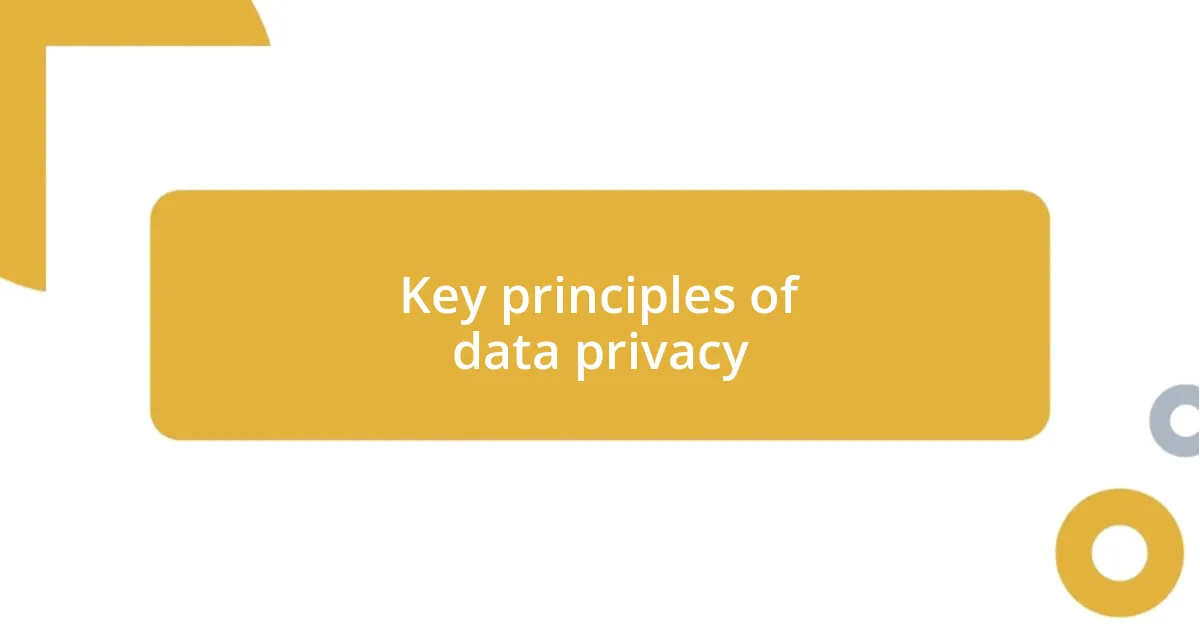
Key principles of data privacy
When considering data privacy, several key principles come to mind, each designed to safeguard our personal information. I often reflect on the importance of transparency, as it allows individuals to understand what data is being collected and how it’s used. A clear privacy policy can ease the anxiety I feel about sharing my information, providing a sense of control over my data and its trajectory.
Here are some key principles of data privacy to consider:
- Consent: Users should give explicit permission before their data is collected.
- Purpose Limitation: Data should only be collected for specific, legitimate purposes.
- Data Minimization: The amount of data collected should be limited to what is necessary for the stated purpose.
- Access and Correction: Individuals must have the ability to access their data and correct inaccuracies.
- Accountability: Organizations must take responsibility for protecting the data they collect and maintain.
Thinking about these principles, I remember a time when I opted out of a service because their privacy practices were opaque. That feeling of uncertainty pushed me to choose a competing app with clearer consent and transparency. It’s a small but powerful decision in the grand scheme of online interactions. Each choice I make, guided by these principles, gives me more agency over my digital life.
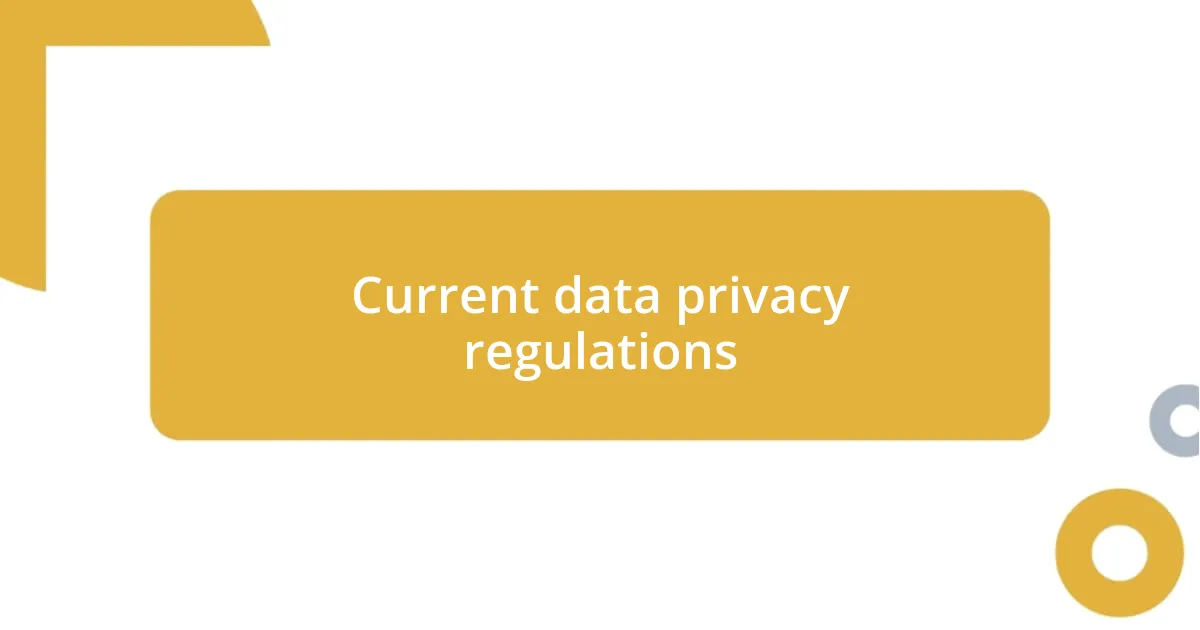
Current data privacy regulations
Understanding current data privacy regulations is vital for anyone navigating the digital landscape. Over the past few years, I’ve seen an evolution in these regulations, primarily driven by increased public awareness and concern about data misuse. For instance, the General Data Protection Regulation (GDPR) in Europe has set a benchmark for data protection legislation, mandating that companies gain user consent before collecting personal data. This regulation not only elevates user rights but also requires businesses to prioritize transparency, which resonates with my personal desire for clarity in how my information is handled.
In the United States, the landscape is a bit more fragmented, with laws varying by state. The California Consumer Privacy Act (CCPA) is another stride toward privacy protection, giving Californians rights similar to those offered by the GDPR. Personally, I feel reassured knowing that I can request a business to disclose the data it has collected about me, affirming that my data isn’t just floating in the void, but is subject to scrutiny and choice. Yet, I can’t help but wonder: how does such regulation impact smaller businesses that might struggle to comply?
Lastly, as I explore regulations like the Health Insurance Portability and Accountability Act (HIPAA), I appreciate the specialized focus on health information. These regulations resonate deeply with me given the sensitivity of health data. I once signed up for a telehealth service and felt at ease knowing my medical data was shielded under strict regulations. This personal experience highlights the importance of regulatory frameworks that not only protect individual data but also build trust in service providers.
| Regulation | Region |
|---|---|
| GDPR | European Union |
| CCPA | California, USA |
| HIPAA | USA (Health Data) |
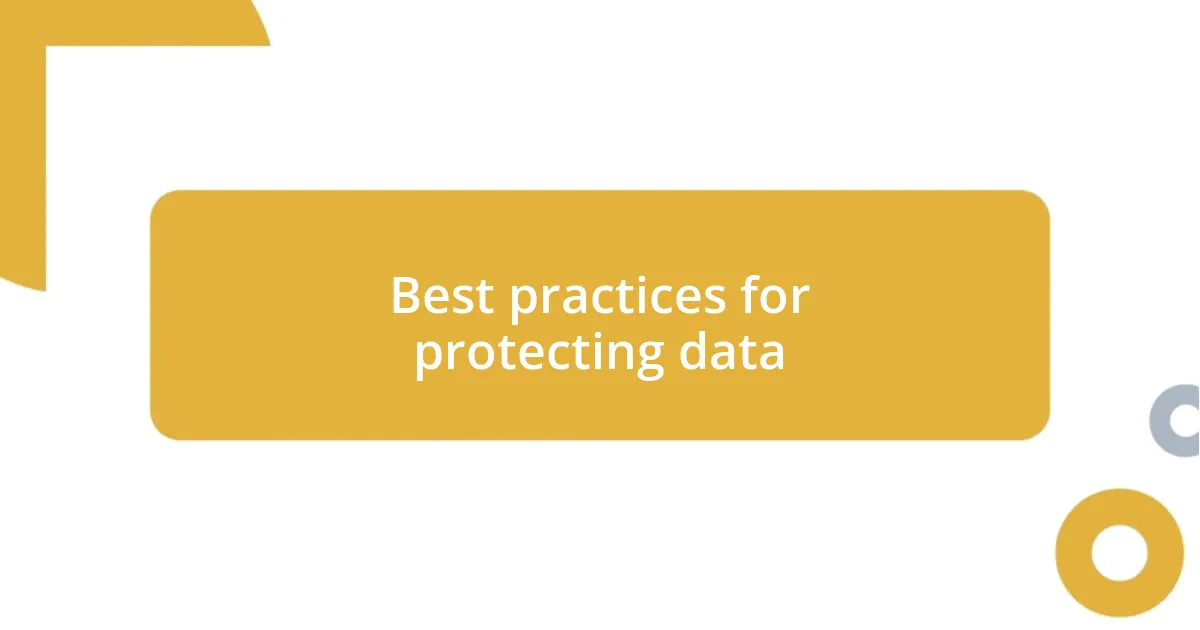
Best practices for protecting data
To effectively protect data, I’ve found that implementing strong passwords is crucial. I remember when I used the same password across multiple accounts, thinking it was easier to remember. It wasn’t until a friend shared a horror story about their account getting hacked that I realized the danger. Now, I use unique, complex passwords for each service and I even utilize a password manager to keep everything organized. This shift has given me greater peace of mind.
Another key practice is enabling two-factor authentication (2FA). Initially, I was hesitant about the additional steps, but I soon learned the benefits. Just the thought of a secondary layer of security reassures me whenever I log into sensitive accounts. It’s a bit of an inconvenience, but that small effort significantly decreases the risk of unauthorized access. Isn’t it interesting how a little extra effort can go such a long way in safeguarding our information?
Lastly, I find that regularly reviewing app permissions is essential. I was surprised to discover that some applications had access to my location and contacts even when it wasn’t necessary for their function. This realization drove me to scrutinize and adjust permissions more carefully. I think we often forget to check these settings, but doing so helps ensure our data stays in our control. Have you ever re-evaluated your app permissions? The feeling of reclaiming that control is empowering!
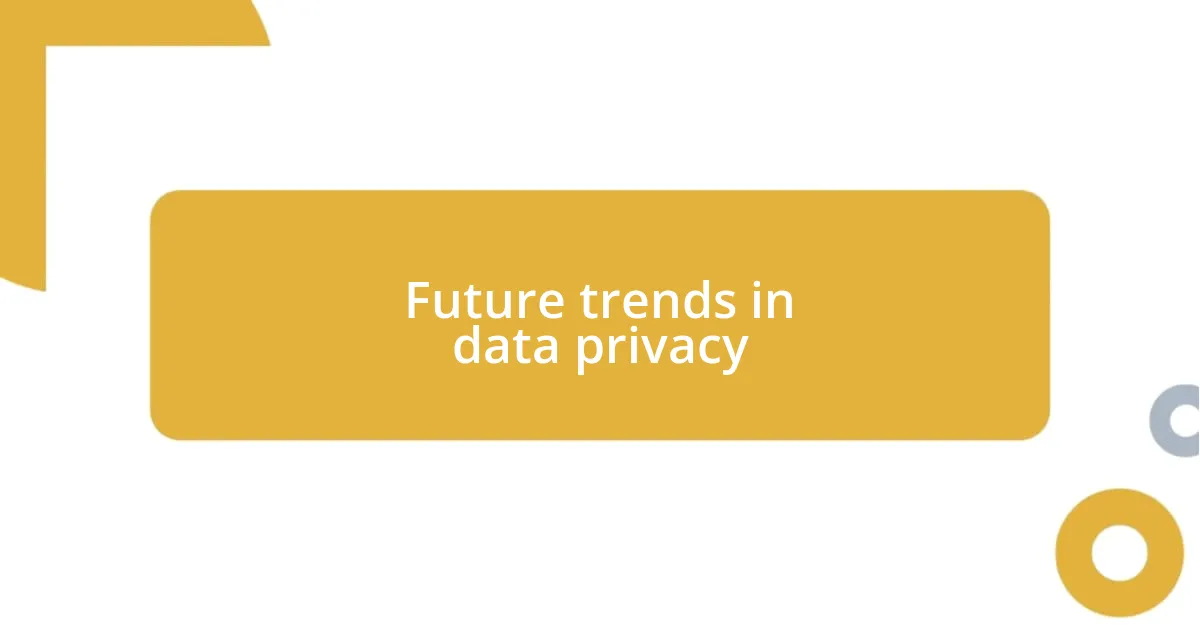
Future trends in data privacy
The future of data privacy is evolving rapidly, reflecting our growing awareness of its importance. As companies strive to remain compliant with regulations like GDPR and CCPA, I believe we will see an increase in privacy-focused technology. I recently stumbled upon several tools that anonymize user data before it’s even collected, which left me feeling hopeful that businesses can prioritize user privacy without sacrificing innovation. Have you ever imagined a world where your online interactions remain private while enjoying the benefits of technology?
Artificial Intelligence (AI) will play a pivotal role in shaping future data privacy trends. With its ability to analyze vast amounts of data, AI can help identify vulnerabilities and threats that might go unnoticed. I remember a moment when my favorite app notified me of a potential breach before any sensitive information was compromised. That proactive approach not only made me feel safer but highlighted how technology could become a reliable ally in safeguarding privacy. Isn’t it fascinating how AI can transition from a tool of collection to a protective layer?
Additionally, I foresee a shift toward a more user-centric model where individuals have greater control over their personal data. Personally, I’d love to see a future where I can easily manage what information I share and with whom, perhaps even having the option to monetize my own data. This would not only empower users like me but also drive companies to be more transparent and ethical in their data practices. If we can take charge of our own data, how might that change the landscape for businesses and consumers alike?
